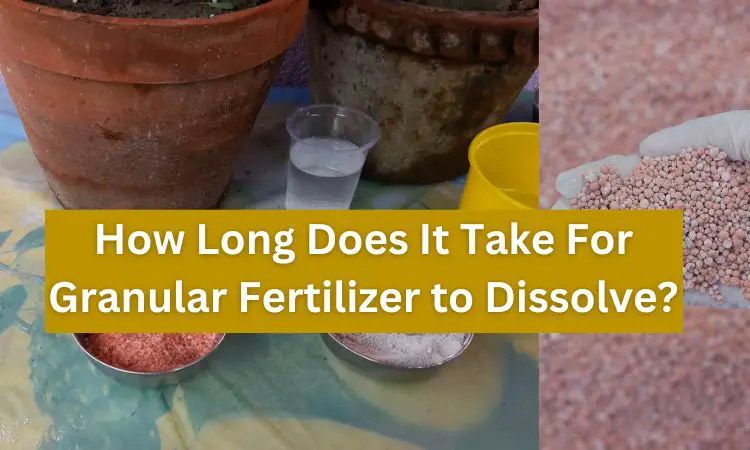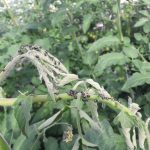Copper sulfate is commonly used in the garden to control fungal diseases. In the garden, copper sulfate can be applied as a spray to treat plant diseases caused by fungi and to deter slugs and snails. Generally. it can be applied directly to plant leaves, branches, and stems.
The process of using copper sulfate is straightforward. To prepare a copper sulfate solution, you can:
- Mix 20 g of copper sulfate with 1 liter of water.
- Stir the mixture until it’s completely dissolved.
- Pour the mixture into a sprayer.
- Spray the mixture onto your plants.
N:B: You should avoid spraying on hot, windy, or rainy days. You should also refrain from spraying healthy parts of the plant.
What Is Mixing Ratios for Copper Sulfate?
Mixing ratios for copper sulfate tell us how much of this special stuff to mix with water for different jobs.
If we want to stop plant diseases, we mix 3 tablespoons of copper sulfate with a big gallon of water.
For fruit trees, which sometimes get sick, we mix three and one-third tablespoons of copper sulfate with ten tablespoons of hydrated lime in a gallon of water.
That keeps the trees healthy.
Copper sulfate can move in the soil when it rains, which is cool.
But we should be careful and not use it on veggies with leaves we eat because it tastes bad and isn’t great for us.
So, remember, follow the mixing directions to help plants stay healthy without causing any problems for people or the environment.

How Does Copper Sulfate Work on Garden Plants?
Read: What Lawn Fertilizer is Safe For Well Water? ( Solution )
Copper sulfate is a versatile substance commonly used in gardening and agriculture, primarily as a fungicide and fertilizer.
It serves multiple purposes, such as preventing plant damage from mold and fungi, addressing unwanted root growth, and targeting algae infestations.
One of its primary functions is to disrupt the cellular processes of algae and moss, effectively eliminating these unwelcome growths.
Additionally, it works on bacteria that feed on plant tissue, contributing to overall plant health.
One notable aspect of copper sulfate’s action is its ability to induce plants to absorb more water than they can effectively utilize.
This excess water uptake can lead to plant stress and, in some cases, plant death, making copper sulfate a potent tool for managing certain plant issues.
Moreover, copper sulfate penetrates cell membranes and disrupts enzymes, affecting the normal functioning of cells and organisms that come into contact with it.
5 Ways to Effectively Use Copper Sulphate in Your Garden
As an Agriculturist, I must say, that copper sulfate is a great substance for garden care with immediate effects. Though several problems may arise here are the 5 most useful ways to use copper sulphate in your garden.

1) Improving Soil Conditions
Copper sulfate improves soil conditions. Its antimicrobial properties can help control bacterial and fungal diseases, promoting healthier plant growth.
Copper sulfate is sometimes utilized as a fertilizer in gardening and agriculture.
Its primary function as a fertilizer is to boost the copper content in the soil.
This addition of copper can be beneficial in addressing specific soil conditions, particularly in soils that are peaty and acidic in nature.
Peaty and acidic soils can present challenges for plant growth because they may lack essential nutrients and have pH levels that are not conducive to many plants.
Copper sulfate can help rectify these issues by increasing the copper content in the soil.
However, it can also enhance nutrient availability in soil. Here are some ways copper sulfate can improve soil conditions:
| Benefits of Copper Sulphate | Key Notes |
| Promotes Nutrient Absorption | Increases copper availability in soil, aiding nutrient uptake like iron and phosphorus. |
| Stimulates Root Development | Enhances root growth, improving nutrient and water absorption. |
| Enhances Crop Yield | Boosts yields, particularly in copper-demanding crops like fruit trees and certain vegetables. |
| Aids in Chlorophyll Production | Supports increased chlorophyll synthesis, vital for photosynthesis. |
| Supports Enzyme Activity | Facilitates efficient enzyme function, promoting overall plant health. |
Related: What is 18-18-18 fertilizer used for?
2) Reducing Soil Alkalinity
Copper sulfate isn’t just about nutrient availability; it can also reduce soil alkalinity for better plant growth. It acts as an acidifier, lowering the pH of alkaline soil and improving nutrient access.
Besides, it counters lime’s alkaline effects and prevents nutrient lock-up, ensuring vital nutrients are available to plants.
Additionally, it enhances soil structure by breaking down compacted particles, improving drainage and root penetration.
This makes copper sulfate a valuable tool for creating a healthier environment for plants to thrive.
N.B: copper sulfate becomes ineffective at alkalinities above 300 ppm. But super effective with alkalinity values over 50 parts per million

3) Controlling Fungal Diseases
Copper sulfate is an inorganic compound that can kill fungi, bacteria, and algae. It’s an approved pesticide. It works by binding to proteins in fungi and algae, damaging the cells and causing them to leak and die.
It can be used to control fungal diseases on vegetables, fruits, ornamentals, turf.
Vegetables:
- Powdery Mildew
- Late Blight
Fruits:
- Brown Rot
- Apple Scab
Ornamentals:
- Rose Black Spot
- Powdery Mildew
Turf:
- Dollar Spot
- Brown Patch
.
4) Foliar Spray
Foliar spraying with copper sulfate is a helpful technique in gardening to fight fungal diseases and boost plant health.
This process includes diluting copper sulfate in water and applying it directly to the plant’s leaves.
To prepare the copper sulfate solution, follow these steps:
Start by adding 1 tablespoon of copper sulfate crystals to 1 gallon of water. Stir thoroughly until the crystals dissolve completely.
When mixing the solution, it’s essential to use a plastic or glass container rather than a metallic ones. This prevents any unwanted chemical reactions with metal that could affect the solution’s effectiveness.
Some common vegetables that can benefit from foliar spray with copper sulfate include:
- Tomatoes
- Peppers
- Cucumbers
- Squash
- Eggplants
- Potatoes

5) Seed Treatment
Copper sulfate is an antimicrobial treatment that enhances seed storage conditions. It effectively hinders the growth of several harmful oomycete pathogens, such as Phytophthora and Halophytophthora.
By using copper sulfate, infection rates can be significantly reduced, with up to an 86% decrease observed.
However, it’s worth noting that at lower levels of salinity, infection can be entirely eliminated.
Still, this comes with the trade-off of a tenfold reduction in green seed germination rates.
Key Considerations For Seed Treatment
- Concentration
- Duration of soaking
- Seed compatibility
- Safety precautions
Read: How to Keep Squirrels and Rabbits Out of the Garden? ( Immediate Answer)
Frequently Asked Questions
How Much Copper Sulfate Do I Add To the Soil?
The amount of copper sulfate you should add to soil depends on various factors, including the specific purpose of the application, the type of soil, and the plant or crop you are growing.
Copper sulfate is typically used for specific soil treatments, such as correcting copper deficiencies or addressing fungal issues.
Here are some general guidelines:
| Application Method | Copper Sulfate Amount |
| Soil Drench | 10-15 grams per liter of water |
| Foliar Spray | 20-30 grams per liter of water |
| Soil Test | 3.5 oz per 1,000 square feet |
| Planting | 1 tablespoon (approx. 10g) per square meter of soil |
How Much Copper Sulfate Do You Mix With Water?
You can prepare a copper sulfate solution by dissolving one teaspoon of copper sulfate in approximately one gallon of water using a plastic container. This mixture is suitable for treating an area of 300 square feet with an average soil depth of 1 foot.
For instance, if you need to treat a larger area, such as 600 square feet with an average depth of 2 feet, you would require 4 teaspoons of copper sulfate dissolved in a larger volume of water.
- Treating Trees, Shrubs, Gardens, and Lawns: Dilute 10-25 ml of copper sulfate in 100 gallons of water for application.
- Treating Filamentous Algae: Dissolve one teaspoon of copper sulfate in a gallon of water to treat a 300-square-foot area with an average depth of 1 foot.
- Using as a Digestive Aid for Poultry: Mix 1 oz of copper sulfate with 5 gallons of water and administer it to poultry for three consecutive days.

Is Copper Sulfate Bad For Soil?
Copper sulfate is a copper-based fungicide that can leach into soil over time. It can affect the pH and copper levels in the soil. High copper levels can be toxic to certain plants, especially those that are sensitive to copper.
Overuse of copper sulfate can cause a toxic buildup of copper in the soil. This can result in a variety of negative effects, including:
- Toxicity
- Environmental Impact
- Development of Resistance
- Safety Concerns
Can I Use Copper Sulfate On Tomato Plants?
Copper sulfate, with its historical use by vintners in the Bordeaux region of France, has a well-established reputation for its effectiveness in preventing the growth of mold and various fungi on grapevines.
This application, known as the Bordeaux mixture, has been a longstanding practice in viticulture to protect grapevines from devastating fungal diseases, particularly downy mildew and powdery mildew.
Interestingly, the effectiveness of copper sulfate extends beyond the realm of grapevines.
While it may not be as commonly associated with other fruits and vegetables, such as tomatoes, it can still be a valuable tool in their cultivation.
Tomatoes, like grapes, can be susceptible to fungal diseases, including various forms of mildew and blight
Conclusion
Overall, Copper sulfate offers two application methods in the garden: soil application and foliar feeding.
For foliar feeding, you can create a solution by mixing one tablespoon of copper sulfate with one gallon of water.
Simply spray this solution onto the leaves of your plants.
To achieve the desired outcomes, repeat this process once a week until you observe the results you’re aiming for.
Reference: https://www.sciencedirect.com/science/article/pii/S2351989422000816# https://scialert.net/abstract/?doi=ijb.2011.200.204#

I am a graduate of Bangladesh Agricultural University, where I delved into various agricultural disciplines, equipping me with a profound understanding of agriculture. Beyond academics, I have hands-on experience in gardening and crop cultivation. My passion is to embrace sustainable farming and horticulture. With a BSc in Agriculture, I am dedicated to promoting environmentally conscious and efficient agrarian practices.
Bachelor of Science (BSc) in Agriculture (Hons.)
Master of Science. (Sustainable Agriculture & Food Security ) (MS)
Bangladesh Agricultural University




